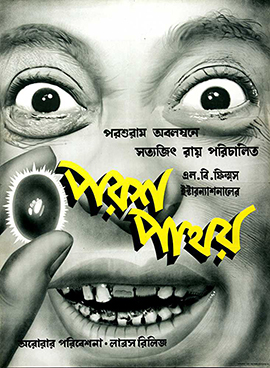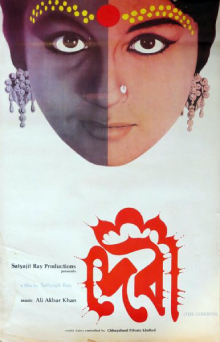
Apur Sansar, also known as The World of Apu, is a 1959 Indian Bengali-language drama film produced, written and directed by Satyajit Ray. It is based on the second half of Bibhutibhushan Bandopadhyay's novel Aparajito. Following Pather Panchali (1955) and Aparajito (1956), The World of Apu is the final part of Ray's The Apu Trilogy, about the childhood and early adulthood of a young Bengali named Apu in early twentieth century India. The World of Apu stars Soumitra Chatterjee and Sharmila Tagore ; the duo would go on to appear in many subsequent Ray films.

Charulata is a 1964 Indian drama film written and directed by Satyajit Ray. Based upon the novel Nastanirh by Rabindranath Tagore, it stars Soumitra Chatterjee, Madhabi Mukherjee and Sailen Mukherjee. The film is considered one of the finest works of Ray.

Jalsaghar is a 1958 Indian Bengali drama film written and directed by Satyajit Ray, based on a popular short story by Bengali writer Tarasankar Bandyopadhyay, and starring Chhabi Biswas. The fourth of Ray's feature films, it was filmed at Nimtita Raajbari, in Nimtita, Aurangabad, Murshidabad. Despite initial poor critical reception in India, Jalsaghar went on to win the Presidential Award for best film in New Delhi, and played a significant role in establishing Ray's international reputation as a director. It has since gained near-universal critical acclaim, and has come to be regarded by the cinema community as one of the greatest films of all time.

Parash Pathar is a 1958 Bengali language Indian fantasy comedy film. It was Satyajit Ray's first film outside of The Apu Trilogy. It was also his first comedy and first magical realist film. Adapted from a short story of the same name by Parasuram, the film offered an early glimpse of Ray's sense of humour, centered on a middle-class clerk who accidentally discovers a stone that can turn other objects into gold.

Nayak is a 1966 Indian Bengali-language drama film composed, written, and directed by Satyajit Ray. It was Ray's second entirely original screenplay, after Kanchenjungha (1962). The story revolves around a matinee idol on a 24-hour train journey from Kolkata to Delhi to receive a national award. However, he ends up revealing his mistakes, insecurities and regrets to a young journalist, who realises that behind all his arrogant facade lies a deeply troubled man as his life's story is gradually revealed through seven flashbacks and two dreams. The film starring Uttam Kumar in main protagonist and Sharmila Tagore played second lead.

Devi (transl. Goddess) is a 1960 Bengali-language Hindu drama film by director Satyajit Ray, starring debutante Sharmila Tagore and Soumitra Chatterjee. It is based on a short story by Prabhat Kumar Mukhopadhyay. The film is based on the worship of women and young girls as incarnations of the goddesses Durga or Kali, which is more prevalent in Nepal as the Kumari tradition.
Subrata Mitra was an Indian cinematographer. Acclaimed for his work in The Apu Trilogy (1955–1959), Mitra often is considered one of the greatest Indian cinematographers.

Rabindranath Tagore is a 1961 Indian documentary film written and directed by Satyajit Ray about the life and works of noted Bengali author Rabindranath Tagore. Ray started working on the documentary in early 1958. Shot in black-and-white, the finished film was released during the birth centenary year of Rabindranath Tagore, who was born on 7 May 1861. Ray avoided the controversial aspects of Tagore's life in order to make it as an official portrait of the poet. Though Tagore was known as a poet, Ray did not use any of Tagore's poetry as he was not happy with the English translation and believed that "it would not make the right impression if recited" and people would not consider Tagore "a very great poet," based on those translations. Satyajit Ray has been reported to have said about the documentary Rabindranath Tagore in his biography Satyajit Ray: The Inner Eye by W. Andrew Robinson that, "Ten or twelve minutes of it are among the most moving and powerful things that I have produced."
Bansi Chandragupta (1924–1981) was an Indian art director and production designer, regarded among the greatest of art directors of Indian film industry. He won Filmfare Best Art Direction Award thrice, for Seema in 1972, for Do Jhoot in 1976 and for Chakra in 1982. He was awarded Evening Standard British Film Award posthumously for "best technical/artistic achievement" in 1983. He was born in 1924 in Sialkot, Punjab, British India and died on 27 June 1981 in Brookhaven, New York, United States.
Chunibala Devi was an Indian character actress best known for her performance in Satyajit Ray's Pather Panchali, where she played the old aunt, Indir Thakrun, to Apu and Durga.

Karuna Banerjee was a Bengali actress best known for her role in Satyajit Ray's The Apu Trilogy (1955–1959) as the long suffering mother, Sarbajaya. She was nominated for Best Actress at the 1959 BAFTA Awards for her performance in Aparajito (1956), the second part of The Apu Trilogy. She appeared in a number of other films after that, including Ray's Devi (1960) and Kanchenjungha (1962).

Bijoya Ray was the wife of the Indian filmmaker Satyajit Ray. Their son Sandip Ray is also a film director. Bijoya and Satyajit were first cousins. Bijoya's father was the eldest half brother of Satyajit Ray's mother. After a long courtship, they were married in 1949. Bijoya Ray acted and sang playback song in a Bengali feature film called Shesh Raksha in 1944 and also acted in the documentary Gaach by Catherine Berge in 1998. She died in Kolkata on 2 June 2015, aged 97, after suffering from acute pneumonia.

Chhabi Biswas was an Indian actor, primarily known for his performances in Tapan Sinha's Kabuliwala and Satyajit Ray's films Jalshaghar, Devi and Kanchenjungha (1962).

Satyajit Ray was an Indian director, screenwriter, documentary filmmaker, author, essayist, lyricist, magazine editor, illustrator, calligrapher, and composer. Ray is widely considered one of the greatest and most influential film directors in the history of cinema. He is celebrated for works including The Apu Trilogy (1955–1959), The Music Room (1958), The Big City (1963) and Charulata (1964) and the Goopy–Bagha trilogy.

Cinema of West Bengal, also known as Tollywood or Bengali cinema, is an Indian film industry of Bengali-language motion pictures. It is based in the Tollygunge region of Kolkata, West Bengal, India. The origins of the nickname Tollywood, a portmanteau of the words Tollygunge and Hollywood, dates back to 1932. It was a historically important film industry, at one time the centre of Indian film production. The Bengali film industry is known for producing many of Indian cinema's most critically acclaimed global Parallel Cinema and art films, with several of its filmmakers gaining prominence at the Indian National Film Awards as well as international acclaim.

Goopi Gawaiya Bagha Bajaiya is a 2013 Indian animated film directed by Shilpa Ranade. It is based on the characters Goopy and Bagha created by Satyajit Ray's grandfather Upendra Kishore Roychowdhury. The film is inspired from Goopy Gyne Bagha Byne, the first film from Goopy Gyne Bagha Byne trilogy. The film was released on 1 March 2019 in India.
Jahar Ganguly was an Indian actor and theater personality. He received Best actor award in 6th Annual Bengal Film Journalists' Association Awards in 1943 for his performance in Bandi.
Noukadubi is a Bengali drama film directed by Naresh Chandra Mitra based on a 1906 novel of the same name of Rabindranath Tagore. This film was released on 19 September 1947 under the banner of Bombay Talkies. This is a remake of 1946 Hindi film Milan made by the director Nitin Bose where Dilip Kumar starring in the lead role. It was among the big Bengali grossers of 1947.
Achena Uttam is a 2022 Bengali-language biographical film directed by Atanu Bose and produced by Alaknanda Arts. Music is composed by Upali Chattopadhyay. The storyline of the film is based on Uttam Kumar.

Aparajito, also known as Aparajito – The Undefeated, is a 2022 Indian Bengali-language biographical film directed and co-written by Anik Dutta. It was produced by Firdausul Hasan and Probal Halder under the banner of Friends Communication, and is based on the making of the film Pather Panchali by Satyajit Ray. The film, being shot in black and white, stars Jeetu Kamal in the title role of Aparajito Ray.














